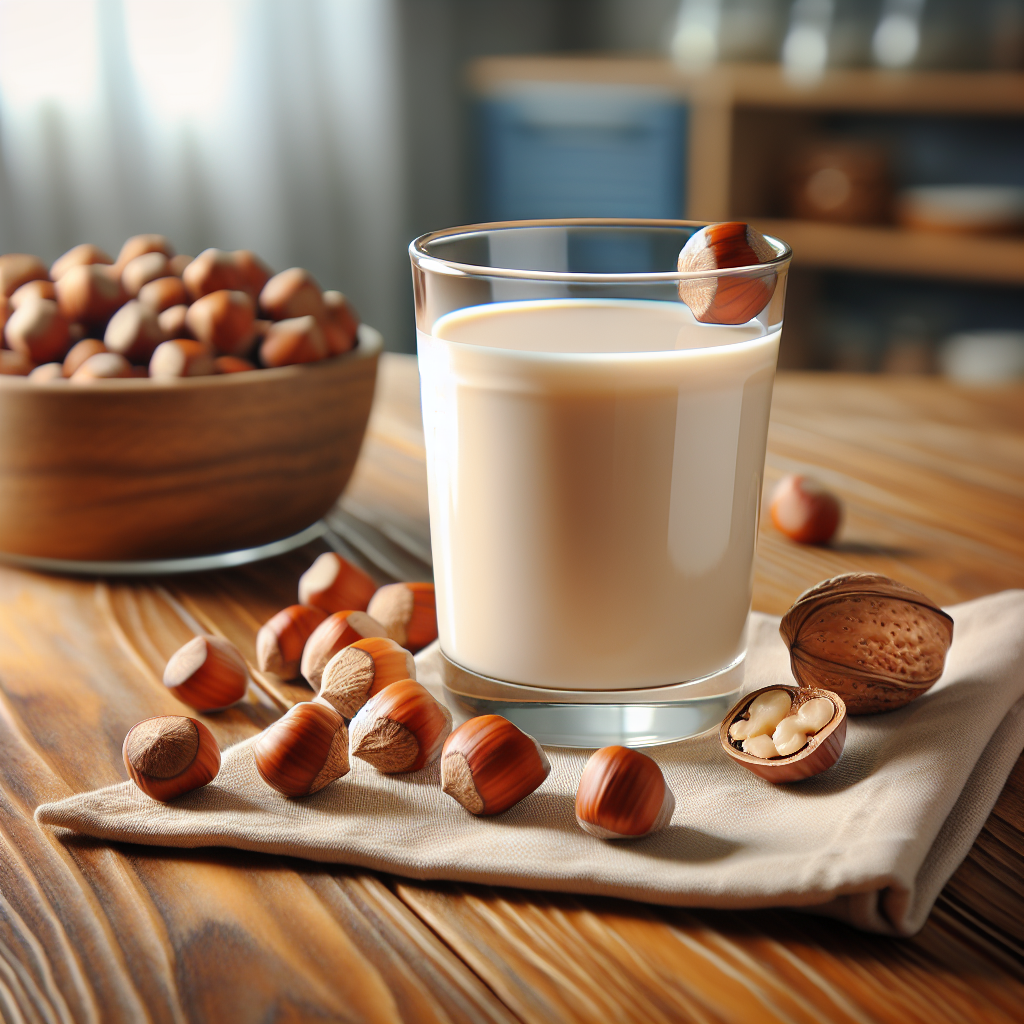In the realm of dairy-free alternatives, hazelnut milk is rising to prominence. This delightful plant-based milk is made from hazelnuts, known for their rich, nutty flavor and numerous health benefits. Unlike traditional dairy milk, hazelnut milk is naturally lactose-free, making it an excellent choice for those who are lactose intolerant or looking to reduce their dairy intake.
Hazelnut milk stands out not only for its taste but also for its nutritional profile. It is packed with essential vitamins and minerals like vitamin E, magnesium, and healthy fats. These nutrients contribute to better heart health, improved brain function, and glowing skin. Plus, hazelnut milk contains no cholesterol, which is a significant advantage for those keeping an eye on their heart health.
One of the most appealing aspects of hazelnut milk is its versatility. It can be used in a variety of recipes, from smoothies and coffee to baked goods and savory dishes. The rich, creamy texture adds a luxurious feel to any meal or beverage, making it a popular choice among food enthusiasts and health-conscious individuals alike.
For those who prefer to make their own hazelnut milk at home, MilkDepot.com offers an innovative solution. Our unique blender can turn hazelnuts into fresh, filtered milk in under 60 seconds. This eco-friendly approach not only ensures that you get the freshest milk possible but also helps you save up to 90% of the cost of store-bought options.
Get yours today! Experience the convenience and health benefits of homemade hazelnut milk with MilkDepot.ca.
Health Benefits of Hazelnut Milk

One of the most compelling reasons to incorporate hazelnut milk into your diet is its myriad of health benefits. Unlike traditional dairy milk, hazelnut milk is naturally free from lactose, making it an excellent alternative for those with lactose intolerance or dairy allergies. Beyond its lactose-free nature, hazelnut milk offers an array of nutrients that can contribute to overall well-being.
Rich in antioxidants: Hazelnuts are packed with antioxidants, particularly vitamin E. These antioxidants play a crucial role in protecting your cells from oxidative stress and may help reduce the risk of chronic diseases such as heart disease and cancer.
Heart health: Hazelnut milk is a good source of healthy fats, including monounsaturated fats, which are known to support heart health by lowering bad cholesterol levels and raising good cholesterol levels. Additionally, the magnesium in hazelnuts helps regulate heart rhythm and blood pressure.
Brain function: The high levels of vitamin E and healthy fats in hazelnut milk can also benefit brain health. These nutrients support cognitive function and may help prevent neurodegenerative conditions like Alzheimer's disease.
Bone health: While hazelnut milk may not be as high in calcium as dairy milk, it still provides a decent amount of this essential mineral. Additionally, it contains magnesium and phosphorus, which are vital for maintaining strong bones and teeth.
Skin health: The vitamin E in hazelnut milk contributes to healthy, glowing skin. This powerful antioxidant helps combat free radicals, reducing the signs of aging and keeping your skin looking youthful and vibrant.
With such a wide range of health benefits, it's no wonder that hazelnut milk is becoming a popular choice for those looking to improve their diet and overall health.
How to Make Hazelnut Milk at Home
Making hazelnut milk at home is a straightforward process that allows you to enjoy the freshest, most nutritious milk possible. Plus, it gives you the flexibility to customize the flavor and sweetness to your liking. Here's a simple guide to creating your own delicious hazelnut milk in just a few easy steps.
Ingredients:
- 1 cup of raw hazelnuts
- 1300ml water
- Optional: sweeteners like dates, honey, or maple syrup; flavorings like vanilla extract or cocoa powder
Instructions:
- Soak the hazelnuts: Place the raw hazelnuts in a bowl and cover them with water. Allow them to soak for at least 8 hours or overnight. This softens the nuts, making them easier to blend and enhancing their nutrient absorption.
- Blend: Add the soaked hazelnuts and 1300ml of fresh water to your MilkDepot.com blender. Add your sweetener and flavors to the filter basket. Blend on high for about 60 seconds until the mixture is smooth and creamy.
- Store: Transfer the hazelnut milk to an airtight container and refrigerate. It will stay fresh for up to 5 days. Shake well before each use, as natural separation may occur.
By making hazelnut milk at home, you not only save money but also ensure that your milk is free from unwanted additives and preservatives. Plus, it's a fun and rewarding process that lets you enjoy the freshest hazelnut milk possible.
Comparing Hazelnut Milk to Other Nut Milks

When it comes to choosing a dairy-free milk alternative, the options can be overwhelming. From almond and cashew to macadamia and pistachio, each type of nut milk offers unique benefits. Hazelnut milk stands out for its distinct flavor and nutrient profile, but how does it compare to other popular nut milks?
Flavor and Texture:
Hazelnut milk has a rich, creamy texture and a naturally sweet, nutty flavor, making it a favorite for use in coffee, smoothies, and desserts. In contrast, almond milk is lighter and more subtly flavored, while cashew milk is known for its ultra-creamy consistency. Macadamia milk offers a buttery taste, and pistachio milk has a unique, slightly sweet flavor.
Nutritional Profile:
Hazelnut milk is packed with vitamins and minerals, including vitamin E, magnesium, and healthy fats. It also contains antioxidants that can help fight inflammation and support heart health. Almond milk is low in calories and rich in vitamin E but may lack protein unless fortified. Cashew milk provides healthy fats and minerals like copper and magnesium. Macadamia milk is high in monounsaturated fats, which are beneficial for heart health, and pistachio milk offers a good source of protein, fiber, and antioxidants.
Sustainability:
In terms of environmental impact, hazelnut milk is a more sustainable option compared to almond milk, which requires significant water resources to produce. Hazelnuts are typically grown in regions with ample rainfall, reducing the need for irrigation. Other nut milks like macadamia and cashew also have varying environmental footprints, with macadamia being more water-efficient compared to almonds.
Each type of nut milk has its own strengths, and the best choice depends on your personal preferences and dietary needs. Hazelnut milk, with its delicious flavor and impressive nutrient profile, offers a compelling option for anyone looking to diversify their dairy-free milk choices.
Eco-Friendly and Cost-Effective

One of the major reasons people switch to dairy-free alternatives is the environmental impact of traditional dairy farming. Hazelnut milk proves to be an eco-friendly choice that not only benefits your health but also the planet.
Environmental Benefits:
Hazelnuts are typically grown in areas with abundant natural rainfall, such as parts of Europe and the Pacific Northwest. This reduces the need for extensive irrigation, unlike almonds, which require large amounts of water. Moreover, hazelnut trees can be grown on steep terrains and in poor soil conditions, making them a versatile crop that helps prevent soil erosion. They also act as carbon sinks, absorbing more carbon dioxide than they emit, contributing positively to the fight against climate change.
Cost-Effectiveness:
Store-bought nut milks, including hazelnut milk, can be expensive over time. However, making your own hazelnut milk at home can be incredibly cost-effective. Using a high-quality milk-making blender from MilkDepot.com, you can produce fresh, delicious hazelnut milk in less than 60 seconds. Homemade hazelnut milk contains no additives or preservatives, ensuring you get the purest product possible. Plus, you can customize the flavor to your liking by adding natural sweeteners or other ingredients.
In addition to saving money, making your own hazelnut milk significantly reduces packaging waste. By using reusable containers, you contribute less plastic to landfills, making homemade hazelnut milk a more sustainable choice overall.
Switching to hazelnut milk not only provides a healthier, tastier alternative to dairy, but also aligns with eco-friendly and cost-effective living. It's a win-win for both you and the environment!
Delicious Recipes Using Hazelnut Milk

Once you've made your fresh, creamy hazelnut milk, the possibilities for delicious recipes are endless! Here are some mouth-watering ideas to get you started:
1. Hazelnut Milk Latte: Start your morning with a cozy hazelnut milk latte. Simply heat your hazelnut milk and add it to a shot of espresso. Sweeten with a touch of honey or maple syrup for a delightful, nutty twist on your regular coffee.
2. Hazelnut Milk Smoothie: For a nutritious and refreshing treat, blend hazelnut milk with your favorite fruits such as bananas, strawberries, and a handful of spinach. Add a spoonful of chia seeds or protein powder for an extra boost.
3. Hazelnut Milk Porridge: Upgrade your breakfast porridge by cooking oats in hazelnut milk instead of water. Top with fresh berries, a drizzle of almond butter, and a sprinkle of cinnamon for a hearty, delicious start to your day.
4. Hazelnut Milk Ice Cream: Create a decadent, dairy-free ice cream by blending hazelnut milk with frozen bananas, a dash of vanilla extract, and a bit of sweetener. Freeze the mixture until it's firm, then enjoy a creamy, guilt-free dessert.
Transforming your homemade hazelnut milk into these delightful recipes is a breeze with the right equipment. Don't miss out on the chance to explore these culinary creations and more. Get yours today! and start enjoying the versatility and flavor of hazelnut milk in your kitchen.
